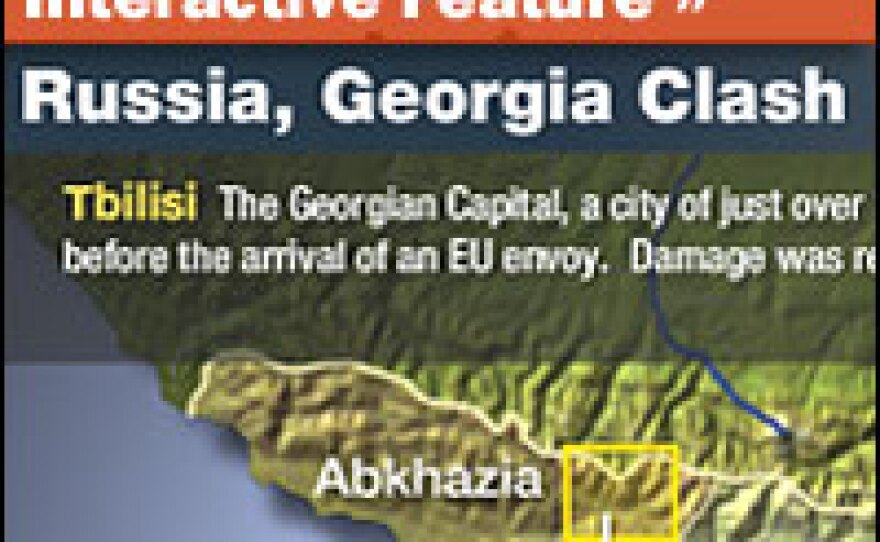
The conflict between Russia and Georgia goes well beyond the separatist enclave of South Ossetia. It's also a reassertion of Russian power along its borders. Here's some background on the immediate issues that triggered the latest round of fighting.
What are the separatist issues bedeviling Georgia?
There are two ethnic groups that claim portions of what is now the Republic of Georgia, the Ossetians and the Abkhazians. Like the Georgians, both groups hail from the Caucasus Mountains at the eastern end of the Black Sea. When the Soviets annexed Georgia after the Russian Revolution, they created autonomous regions in Georgia for each of these groups, and those are the regions that are in dispute today.
As the Soviet Union began to break up in the late 1980s, separatists in both regions resisted becoming part of Georgia, preferring to throw their lot in with Russia.
The two ethnic regions — South Ossetia in eastern Georgia, and Abkhazia, on its western Black Sea coast — have been essentially independent since the last round of fighting in 2004. They've had Russian financial support and military backing in the form of Russian troops who were part of a regional peacekeeping mission. Russia has issued passports to most Abkhazians and Ossetians, so it can say that it is intervening on behalf of its own citizens.
Why is Russia supporting the separatists?
Russian nationalists have chafed at the loss of their Soviet-era buffer zone of republics and former Eastern bloc allies. Georgia has been a particular irritant, especially after the Rose Revolution brought pro-Western President Mikhail Saakashvili to power in 2004. Moscow has strongly opposed Georgia's efforts to become part of NATO, seeing the alliance as a potentially unfriendly military presence on Russia's border. Georgia could become the eastern anchor of a chain of NATO allies that stretches from Poland to Turkey.
Georgia is already a military ally of the United States in Iraq, where Georgia deployed about 2,000 troops. The U.S. airlifted those troops back to Georgia because of the crisis there.
Saakashvili took note of the fact that Prime Minister Vladimir Putin personally oversaw the Russian military operation from a command post in Vladikavkaz, the capital of North Ossetia. Saakashvili said the Russian leader's purpose is "to depose the democratically elected government of Georgia."
Why are the two regions so important to Georgia?
Although it's comparatively small — only about 50 miles across — South Ossetia represents a deep bite into Georgian territory. It extends south toward two of Georgia's most important assets, pipelines that carry oil and gas from Azerbaijan and Turkmenistan to Turkey. Russia opposed the building of those pipelines, which cut Russia out of some of the action in the oil-rich former republics.
Georgia has claimed for years that South Ossetia has become a haven for organized crime, especially the smuggling of tax-free goods from Russia. Georgia has plenty of its own problems with corruption and has been unable to control smuggling elsewhere along the border.
What about Abkhazia?
Abkhazia is important because it includes more than half of Georgia's shoreline on the Black Sea, including ports and some prime tourist areas. Its western edge touches Russia's Black Sea coast, near Sochi, the resort town where Putin has his summer residence.
Abkhazia had a sizable population of ethnic Georgians who were forcibly expelled from the region during the fighting in the early 1990s. Human Rights Watch reported that the Abkhaz separatists committed widespread atrocities against Georgians, including massacres, rapes, torture and ethnic cleansing. The findings were corroborated in a 1994 country report from the U.S. State Department.
There are still pockets of ethnic Georgians living in South Ossetia, and Georgia asserts that it must protect them from the same fate.
What triggered the current fighting?
It began as a series of sniper-fire incidents and clashes between the South Ossetian militia and Georgian army troops during the first week in August. By Aug. 7, Georgian President Saakashvili was charging that the South Ossetians were using heavy weapons that had been brought into the area in violation of the cease-fire. Civilians began to flee Tskhinvali, the town that serves as South Ossetia's capital. On Aug. 8, Saakashvili ordered Georgian troops to capture the city.
Russia responded with airstrikes on Georgian positions, not just in South Ossetia but also in Abkhazia, where Georgian troops still had a foothold in the Kodori Gorge region. Russia has said it is only seeking to restore stability to the two regions, but as its troops advanced out of the separatist regions into undisputed Georgian territory, President Bush accused Russia of seeking to crush the Georgian military and trigger the overthrow of Saakashvili's government.
What can the United States do?
President Bush has called on Russia to stop what he said was a "dramatic and brutal escalation" of violence, and he urged Russia to agree to a cease-fire offer by Georgia. Secretary of State Condoleezza Rice joined in a conference call with foreign ministers from Britain, Canada, France, Germany, Italy and Japan — the G-7 group of leading industrial nations. The group, which often includes Russia as an eighth member, called on Russia to respect Georgia's borders and accept the cease-fire.
The U.S. is also backing mediation efforts by the European Union and the Organization for Security and Cooperation in Europe.
Copyright 2022 NPR. To see more, visit https://www.npr.org. 9(MDAzMjM2NDYzMDEyMzc1Njk5NjAxNzY3OQ001))






